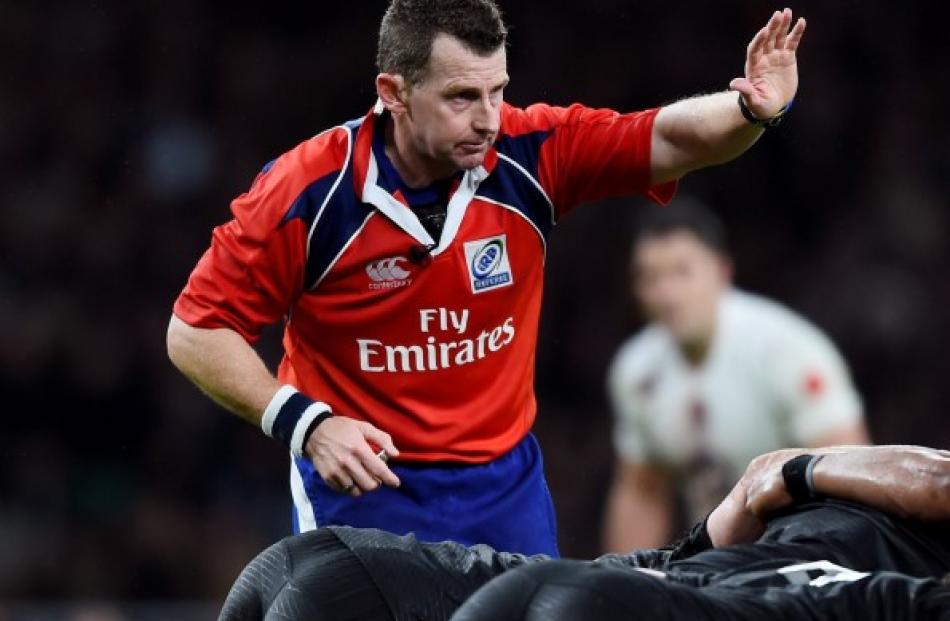One of the biggest issues facing sports in contemporary times has been the treatment of referees by players and supporters, particularly at the junior and community levels, says ODT rugby writer Jeff Cheshire. In part one of a two-part article on this issue he looks at what players want from the people officiating in their games.
Having watched and played for much of my life, I have had plenty of experience dealing with referees of all capacities. Over the past two years I have taken the whistle myself, having refereed four terms of primary and intermediate schools rippa rugby, as well as secondary schools basketball during the 2014 season. It has been an enlightening experience. Having now been involved on both sides, I have learnt a lot of things that I consider extremely valuable and that I wish to share, to help benefit sport as a whole,
For referees
Know when to blow your whistle (and when not to)
From the point of view of a player, there is nothing more annoying than an over-officious referee. Everyone signs up for a sport because they want to do just that, play the sport. They do not want a stop-start game that results in very little sport actually being played. It is a fine line and it is a very, very hard one to walk. But that is what determines the really good referees from the others. The good ones know when it is important they blow their whistle and when it is unnecessary to.
There are certain things that always need to be policed. In sports such as rugby and touch the biggest one is offside lines, while basics such as forward passes and knock-ons are important to call every time too. However, mainly at the top level, you do get too many instances of referees finding something obscure to call, while missing something obvious.
You are not the star of the show
This is aimed more at the high-level referees. The likes of the assistant referees who seem find reasons to get on the field, or the ones who want to stamp their authority on games. The aim of a referee should be to help the game run as smoothly as possible and provide a neutral perspective to making decisions. It does not have to be to make every call that is able to be made.
Likewise, it is not a good look when referees get excited to make big calls, or go looking for big calls to make at important times in a game. Again, call what needs to be called, but do not be the dominating presence in the game and make sure the players get what they want out of the game, especially if they are just playing for fun.
Do not become too far removed from the game
It is no coincidence that some of the best referees are ones who either play a sport, or have recently played. That is not to say other referees are not good, but often it is the referees who are also involved as players that will let the game flow better. That comes purely from having a feel for the game.
They know how annoying it is when something important is not called, or how frustrating it is when something unnecessary is repeatedly called. In extension to this, they have a very good feel for what needs to be called and what is better to be left. Likewise they understand things that while perhaps against the rules, are inevitable and completely unintentional, and will let these go.
The best recent example comes in Glen Jackson, who almost straight away impressed with his ability to let the game flow. He had a natural feel for it from his playing days and it showed. Just as it is important for players to know what it is like to be a referee, it is also important that the referee knows what it is like to be a player. Try not to become too distanced from playing a game, there is more to officiating than just applying a rulebook to the letter of the law.
Communicate well
It is important that everyone knows exactly what you are calling and why. Likewise, if they have questions, be patient and answer them. Particularly in social sport you can get players who may not know the rules too well. When they question a decision or ask what a penalty was for, it often is because they did not know the rule and want to learn it. Another common one is players trying to find out how you specifically are interpreting something.
While it is important not to be swayed by what the players are saying, it can be useful to listen to them. Generally, complaints over the opposition will have at least some basis, while if they ask something such as if you can be louder, that is something to make an effort to do. Players should always respect the referee. It is a two-way street though and it is important that the referee also respects the players.
Do not let your emotions affect you
One of the hardest things to do in refereeing is to remain completely neutral and to not let criticism affect you. If one team or player is being particularly annoying, there can be a tendency to change your refereeing to either keep them happy, or to annoy them even more.
I have experienced both as a player and as a referee have, at times, had to try my utmost to ensure I do not let it influence me. It is not easy to do, but it is important. If you do have a problem personally with a player or team, it should not affect whether or not a decision is made, or indeed the result of a game. Likewise if they do ask a question politely, it does go down well if you answer politely. If you refuse to do so, you are not helping yourself and will only annoy the players even more.
You will encounter different personality types
You will come across all sorts of different people when refereeing sports. While ideally no-one would question your calls and would be completely honest and fair, that is not the reality. Most often you find competitive individuals will get intense during a game and may come across condescendingly in the heat of the moment. You can also get people who may sound condescending without actually meaning to be. That is fine, we are all different and referees should accept people for who they are. The best thing to do is to treat everyone with the same respect, as in most instances they do not have any problem with the decisions after the game has finished.
Understand the level you are refereeing
It is important to understand who you are refereeing and adjust what you do accordingly. You would not referee a game of Under 9 rugby in the same way you would referee the World Cup Final. Make sure the players understand what you are doing and are happy with what you are doing. A social team that is clearly not at all serious is more likely to want you to be more lenient. In a competitive high-level game, you can expect the players know the rules and you can be more officious. Again, call what needs to be called and leave what does not, but do so in relevance to the level of the participants.
Be confident
Ultimately the biggest thing for a referee is to be confident. Be confident not only in your own knowledge and your decisions, but that you know what you saw. Do not let the crowd or players sway your decisions and do not let it influence you if you get a reaction. I became a far better referee as I became more confident. With confidence you feel less pressure and will be more comfortable in a particular situation. By feeling comfortable you can process things far more easily and are going to do a better job, which is really what every wants.
- Part two, for players, will run tomorrow













